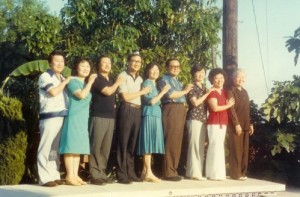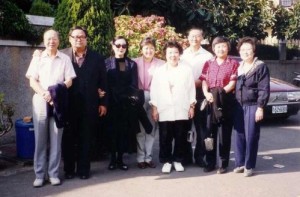
<<Previous¡@¡@Next>> |
|
My dearest brother, ¡@You and I spent the most time together among "Remember the days when we were young, ¡@During the beginning of the Sino-Japanese War, ¡@In the morning, Grandma and Aunties taught us Chinese characters, told us stories, taught us songs; a refugee servant taught us the Chinese phonetic alphabet, which I benefit greatly later in life. Since we were young, Grandpa trained us to be calm and composed, to express our thoughts lucidly, stress on the professionalism of the Germans and learn the compassion and benevolence of the Chinese. ¡@The backyard served as our playground. One day it was snowing, we played so happily until it was time for dinner. We brought the snow in and hid it inside the lobby cabinet drawer. During dinner, the butler suddenly cried out: "Who spilt water on the floor? It made the floor wax turned white." Grandpa quickly shifted his gaze on us and we earnestly replied "we don't know". After dinner, we went back to open the drawer. Weird, who stole our snow? ¡@We loved to sit in a large wooden basin to float in the pond, joined the adults in picking water chestnuts and digging young lotus roots. One day, you and I were picking snails by the pond. There was a big one at the deep end, you asked me to pull your belt so you can reach it. However, I was not able to hold on and you fell into the pond. You quickly got back to the bank from the shallow water but wet all over. We had to go up the hill to dry our clothes before going home. ¡@Our gardener Chang loved to tease the maids. We decided to take charge in revenging for our maids. We used the sticks to tamper with the unripe fruits, which Chang guarded with all his effort. We would go to the garden to catch crickets and overturn the flower pots on purpose. We fled as soon as we heard Chang's voice. Back to our room, we would laugh at Mr. Chang's slow movement. It never occurred to us that if Mr. Chang dared to do anything should he catch us. ¡@After the war, the family and all nine children were together again. We all enrolled at the Catholic school. Seng Kong was a girls' school. Ming Teh was for boys. The two schools were located opposite to each other, with the tall St. Miguel Cathedral in the middle. Only during lunch hours, the boys and girls from each family can have lunch together, thus adds more expectation when waiting for our lunch boxes from home. We stayed with our Grandparents in the city for school, only went to our parent's seaside villa for vacation, where we had many memories by the beach. ¡@Grandma often took us to the Temple and Mom was a very devout Buddhist. You studied Buddhist Sutra and Book of Changes. At the end, you became a Christian. ¡@We moved to Taichung by the end of 1948. The older siblings went to high school and the five of us younger ones entered elementary school. There were few children from Mainland China then. We were good representatives from Grade 1 through Grade 5, thus became a hot topic for the teachers. The next year, the school set up a student guard. You were the chief student guard. Even teachers who were late for school were afraid of you. ¡@Later, you enrolled in Yi Ning Middle School, a school for the children of the Armored Corps. This is the first time that you came in contact with children of military family and heard about the valor and courage of their fathers and brothers. ¡@Many families broke up due to the continuous wars in China. Our father started a machinery factory in Taichung with friends, using his knowledge acquired from the Tokyo Industrial & Technology University in Japan. He insisted that we all need to have a professional training, no one can rely on the family wealth. Marina went to nursing school in the US. Helen and I subsequently enrolled in English Technical College, you went to Technical College, David went to Agricultural College. Dad thought that art is not a suitable profession in an unstable world, and opposed Shan-hsi's decision to join the Art Academy. Dad's love was deep-seated though a little radical. ¡@During your third year at school, there was a feverish rush to enroll in the military service. You studied at two schools simultaneously. When you graduated from the Technical College, you obtained Class A Electrician license, also finished the courses at Taichung First High School with flying colors, and received guaranteed placement at the Military Academy. You had always been an outstanding student who excelled both in your academic and moral studies. You possessed great leadership attributes. In your senior year, at the Military Academy, you were selected to be leader of the cadet corps. After graduation, you served at the Quemoy (Kinmen) front, then went to the United States to take up more professional training in infantry, paratrooper, and ranger. Quick-witted, courageous and determined, you made them re-evaluate the ability of Asians. ¡@January 1964, one semester after I enrolled at St. Joseph's College, you came to Columbia University. Every weekend, I always longed for your visit. You not only brought airmail edition of the Central Daily News, but also brought a lot of goodies such as dried pork, dried minced pork. The school had arranged an Irish couple as my guardians. They were not only kind to me but also took you in. Because of your height and credentials, the neighbors thought you were my older brother and you fit the role well. ¡@We would meet at Port Authority and went to Marina's house at New Jersey during holidays. We knew well that in addition to Marina's big hug, the joy of her children, our brother-in-law would bring sumptuous lunch boxes from the Chinese restaurants to fill our appetite. ¡@Columbia University has a far-reaching impact on you. It was at Columbia that you met your beloved wife Sylvia. It was also there that you became friends with Ferdinand Tsien, who later became your business partner. One time, you invited Sylvia to Radio City. She missed her step, fell, broke her finger and was hospitalized. At that time, Sylvia was a lady with many admirers. The hospital was flooded with flowers and chocolates. Soon after, there's a rumor among Chinese students: "our chocolates have found their way to the stomach of Lieutenant Ting." I was so happy for you when I received the good news of you two going steady. Last March in Taiwan, I heard your grandchildren calling you "Grandpa Chocolate", then I realized you not only maintain your interests in chocolates but you also had lots of successors. ¡@After completing her studies, Sylvia returned to Taiwan. She gave you a pair of gold cuff links. The cufflinks have both of your initials, one "T", one "F". A classmate who was not aware of your relationship had said: "Everybody knows that Taiwan is Formosa and Formosa is Taiwan. You don't need to do more propaganda." When I heard this, I laugh until I cried. ¡@Shan-hsi and Agnes, you and Sylvia, Benjamin and I, we were all married in 1966 at different time and places. We made a pact that we will celebrate our 30th wedding anniversary in 1996 together and we did make it, Shan-hsi and Agnes came from Peking, Benjamin and I came from the East Coast of the US. We all went to your home after dinner and discovered that only the six of us were left. No one was available as the photographer. Suddenly, we felt a great sense of sadness. ¡@You had always paid great attention to your manners and postures among the brothers. You did not need designer clothing, but your attire was clean and orderly. You also paid great attention to sports. You once served as Vice Chairman of the Chinese Taipei Olympic Committee. Due to political reasons in Canada, our Olympic team had to return to Taiwan. You wept with the athletes, because you knew the hardship and vigorous training they had gone through to qualify for the Olympics Games. ¡@It was also in 1996, Benjamin and I went to Vietnam for the first time. We toured the Saigon South Development Project which had taken 10 years of hard work. Many of your classmates and friends from the military school joined the workforce after their retirement. You excavated the canals to build ports, you filled the marshlands with remaining sand and built buildings. You told me: " We soldiers know the dreadfulness of wars and unrest by heart, we seek happiness and welfare of mankind in peace." Your operations in Vietnam have won the biggest recognition in the international community after near 20 years of cultivation. The Tan Thuan Export Processing Zone, the Hiep Phuoc Power Plant, and the Saigon South Urban Development Project have provided tens of thousands of employment opportunities and unlimited business opportunities. ¡@Your were courageous but you don't understand wickedness, you were truthful but was not able to be oblivious to your emotion and surroundings. You have never considered patience. Honor is above life because you uphold the belief that a soldier can be killed but not humiliated, you ended your life to show your solemn objection. ¡@There's so much to write about, but I can only record one or two to fill the void of your biography. Lawrence, go and rest in peace. I know you will find peace because in His Kingdom, there's no such thing as betrayal or traps. Marisa |
<<Previous¡@¡@Next>> |

